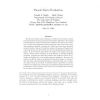Free Online Productivity Tools
i2Speak
i2Symbol
i2OCR
iTex2Img
iWeb2Print
iWeb2Shot
i2Type
iPdf2Split
iPdf2Merge
i2Bopomofo
i2Arabic
i2Style
i2Image
i2PDF
iLatex2Rtf
Sci2ools
119
Voted
ADC
1999
Springer
1999
Springer
Pseudo-Naive Evaluation
We introduce pseudo-naive evaluation, a method for execution of mixed top-down/bottom-up logic programs and deductive databases. The method is intermediate in power between naive evaluation and semi-naive evaluation. Pseudo-naive evaluation adds a data-driven component to naive evaluation without explicitly collecting the ‘delta’ sets of new facts derivable at each iteration. Instead, it identifies certain body atoms as ‘triggers’ and collects an abstraction of the delta sets, thereby simplifying the implementation. A rule is invoked only when new tuples for its trigger atoms are derived. Pseudo-naive evaluation is most efficient on strongly-stratified programs: programs for which all (positive and negative) bottom-up recursion is mediated by an increasing temporal parameter. However, the method can still be used on programs with general recursion, by using either top-down calls, timestamped tuples to represent delta sets, or tupleat-a-time bottom-up execution. A desirable f...
| Added | 03 Aug 2010 |
| Updated | 03 Aug 2010 |
| Type | Conference |
| Year | 1999 |
| Where | ADC |
| Authors | Donald A. Smith, Mark Utting |
Comments (0)

